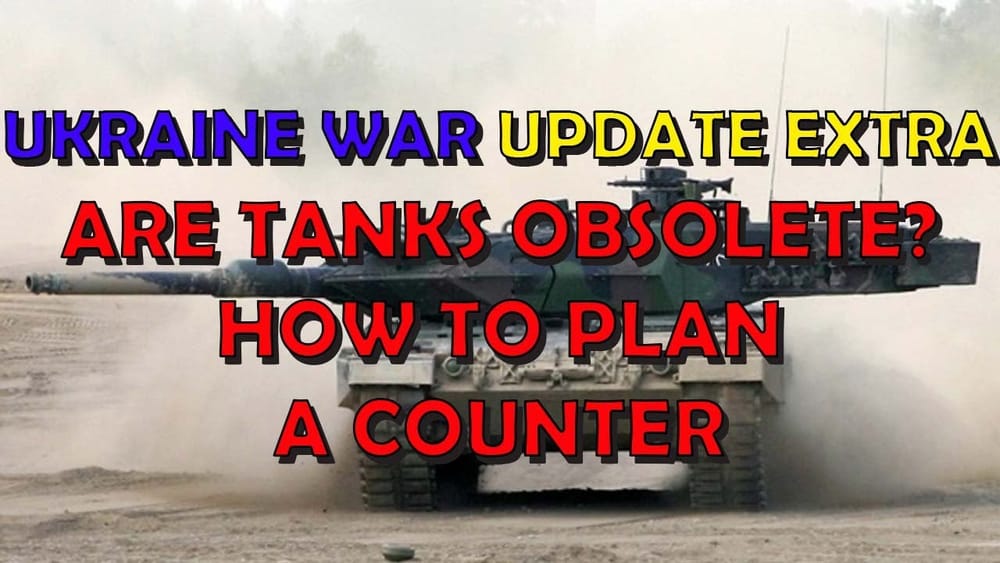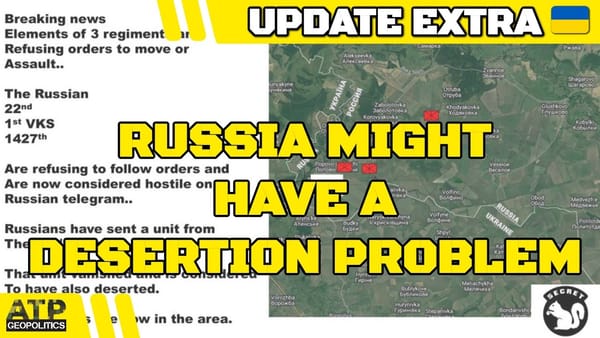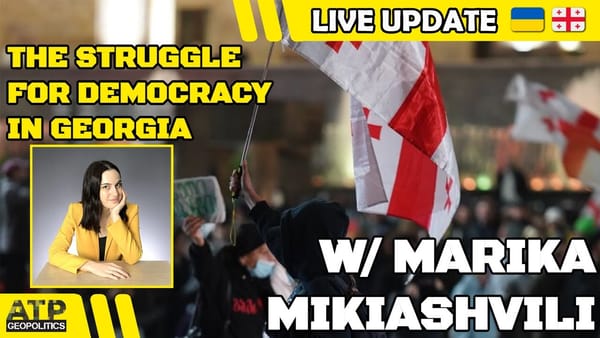Ukraine War Update EXTRA: Planning Counters & Are Tanks Obsolete?
Table of Contents 📖
"It's easy to say Ukraine will regain all their territory, but they can't do that realistically, without air superiority."
Hello Team
🎦 00:00-00:16⏩
Jonathan welcomes everyone to the channel and explains that today's EXTRA video will be relatively short. He plans to address two main topics.
Return to top⤴️
UK Apache Helicopters for Ukraine - Rumour Debunked
🎦 00:16-01:02⏩
Jonathan starts by addressing a recent rumour, published in UK tabloid newspaper The Mirror, which claimed that the UK had promised Apache helicopters to Ukraine. He expresses his doubts about the veracity of the report, highlighting the fact that the newspaper had cited a newer model of Apache, rather than the older models currently in storage. Jonathan reveals that, as expected, The Mirror has now removed the article from its website. He concludes that there was never a realistic chance of this being true.
Return to top⤴️
The Role of Tanks in Modern Warfare - Are they Obsolete?
🎦 01:02-06:14⏩
Jonathan introduces the ongoing debate about the relevance of tanks in modern warfare. He observes that, while Elon Musk and others have declared tanks "obsolete", military experts generally believe they still have a place on the battlefield, provided they are used correctly. Jonathan expands on this point, referencing the current "Free the Leopards" campaign, which is calling for Germany to allow its Leopard tanks to be sent to Ukraine. He observes that Germany has exported Leopard tanks widely, meaning that multiple countries would be able to donate them, as well as assist with maintenance, supplies, and ammunition. Jonathan acknowledges that, while sending tanks to Ukraine seems like an "obvious" course of action, many commentators are only now acknowledging the potential for a long, protracted war in Ukraine. He references an article in The Economist from June 2022, which predicted that this would become a protracted war, as well as highlighting that his own September 2022 thread explored the same issue. Jonathan explains that Russia is currently in a position where it cannot win, but its leadership will not allow it to lose. He argues that this is why Putin hasn't been offered an "off-ramp" - there isn't one, given Putin's objectives, which are unacceptable to Ukraine. Jonathan argues that this has created a "terrible stasis". Returning to the issue of tanks, Jonathan cites an article by Paul Post, who argues that the debate about tank obsolescence misses a fundamental point: tanks provide "mobile protected lethality" and are essential for "holding land". He references The Economist’s interactive explainer on tanks, which sets out the history of the tank and explains that its purpose is to move troops forward, shield them as they advance, and provide firepower. Jonathan emphasizes that, while tanks remain relevant, they are not effective in isolation; they must be used as part of a combined arms strategy, which incorporates infantry, air power, artillery, and logistics. He returns to the importance of achieving air superiority in order for a combined arms offensive to be successful and observes that the air space above Ukraine remains "contested". He concludes that, for these reasons, the failure of Russian tanks to make a decisive impact in Ukraine is not evidence that tanks are obsolete; rather, it demonstrates that they are not being used properly.
Return to top⤴️
Why Tanks Will Be Vital for Ukraine - and What Else They Need
🎦 06:14-11:14⏩
Jonathan moves on to discuss why sending modern tanks to Ukraine would be a potential game-changer in the war. He stresses that tanks, used properly, would significantly bolster Ukraine's fighting capacity and potentially tilt the balance in their favour. However, he clarifies that tanks are not a "silver bullet" solution on their own. He argues that, to be truly effective, tanks must be integrated into a broader, carefully-planned counter-offensive strategy. Jonathan introduces a comment from a viewer, "JD", who unfortunately has since deleted their profile. The viewer argued that, ultimately, Ukraine needs to achieve air superiority to win the war, and suggested that this will be extremely difficult to achieve without destroying every Russian air defense system. Jonathan agrees that, while Ukraine is receiving weapons such as Harm missiles, much more will be needed for them to take back all of their territory. He admits that he hadn't fully considered this before reading JD's comment, having previously imagined Ukraine’s eventual victory to involve a grinding advance by ground forces. However, he acknowledges that this is a simplistic view, and that air superiority is essential for an effective combined arms counter-offensive.
Return to top⤴️
Mick Ryan on Planning Counteroffensives
🎦 11:14-19:35⏩
Jonathan discusses a two-part Twitter thread by Australian military strategist Mick Ryan, which examines how Ukraine and Russia might be planning their respective counter-offensives in 2023. Jonathan focuses on the second part of the thread, which identifies seven key considerations for planning offensives: purpose, design, timing, location, resources, adaptation, and politics. He notes that Ryan had intended to publish the second thread earlier but was delayed by the need to comment on the appointment of Valery Gerasimov as the overall commander of Russia’s forces in Ukraine. Jonathan examines each of Ryan's seven points in detail, starting with resources. He notes that offensives require huge quantities of expensive military equipment, including:
- Reconnaissance assets
- Artillery
- Armour
- Mobility support
- Engineers
- Logistics
- Air support
Jonathan stresses that offensive operations require these elements to be combined into effective fighting formations, such as brigades, divisions, and corps. He also points out the need for "follow-on forces", who can take control of territory that has been captured and ensure that essential infrastructure is rebuilt and that the rule of law is maintained. Jonathan acknowledges that Ryan goes on to discuss the importance of military police, traffic control, civil police, emergency services, and reconstruction personnel, but focuses on the broader point about the importance of follow-on forces. He notes that assembling the resources they require for 2023 will be a major challenge for both sides. Russia, for example, will need to build on its recent, somewhat chaotic, mobilisation efforts if it is to produce sufficient troops, while Ukraine will be reliant on Western aid to provide weapons, ammunition, and other supplies, as well as to help build up its own military industrial capacity. Jonathan highlights Ryan’s argument that, while Russia’s recent mobilisation efforts have seen large numbers of troops sent to the front lines, the quality of these troops is poor, and that they are often used as "cannon fodder" to protect more elite units. He contrasts this with the situation in Ukraine, where mobilised troops are being trained to a much higher standard, both domestically and in NATO countries, and are being equipped with more modern weaponry. Jonathan moves on to discuss Ryan’s sixth consideration: adaptation. He points out that, even when an offensive has been meticulously planned, it is vital to be able to recognise and exploit opportunities as they arise on the battlefield. Jonathan argues that Ukrainian commanders have consistently shown themselves to be more adaptable and opportunistic than their Russian counterparts, who are hampered by a more centralised command structure and a greater reluctance to allow soldiers to use their own initiative. Jonathan references a 2022 report by the Royal United Services Institute (RUSI), which found that the Russian military is “culturally vulnerable to deception” because it struggles to process information quickly and is reluctant to provide context or encourage independent thought. Jonathan concludes that Ukrainian forces are therefore likely to be more successful in adapting their plans to changing circumstances, as well as in deceiving Russian commanders about their intentions. Jonathan concludes his discussion of Ryan’s thread by examining the seventh, and final, consideration: politics. He quotes Prussian military theorist Carl von Clausewitz, who famously argued that "war is not merely an act of policy but a true political instrument, a continuation of political intercourse carried on with other means". Jonathan applies this insight to the war in Ukraine, arguing that political considerations are likely to have a major impact on the timing, location, and objectives of any offensives launched by either side in 2023. He highlights the fact that Gerasimov’s appointment can be seen as a reflection of Putin’s growing impatience for a decisive victory, which could lead to Russia adopting a more aggressive military strategy in 2023. Jonathan also observes that, on the Ukrainian side, President Zelensky will be acutely aware of the need to balance his desire to liberate Ukrainian territory with the need to retain the support of Western backers, some of whom are wary of escalating the conflict. He uses the military concept of a "limit of exploitation" to illustrate this point, explaining that Zelensky is likely to face pressure to halt any Ukrainian advance before it triggers a major escalation by Russia. Jonathan concludes this section of the video by observing that, while there has been much speculation about the timing and location of potential offensives, Ryan’s thread serves as a useful reminder of the complexity of the challenge facing military planners on both sides. He argues that the next phase of the war is likely to be just as difficult and unpredictable as the previous phases.
Return to top⤴️
Jonathan's Analysis: Shaping the Battlefield
🎦 19:35-21:15⏩
Jonathan offers his own analysis, suggesting that Ukraine has been strategically shaping the battlefield in Zaporizhzhia and the southwestern Donbas region, potentially setting the stage for a large-scale offensive in one or both locations. He questions whether the recent intensity of the fighting in Bakhmut might prompt a change in plans, with Ukraine capitalizing on the exhaustion of Russian forces in the area. Turning his attention to Russia, Jonathan expresses scepticism about their capacity to launch major offensives. He suggests that their focus on long-range strikes against Ukrainian infrastructure may be a sign that they lack the resources for a large-scale ground offensive. He reiterates his belief that, without substantial external support, Russia will continue to be militarily degraded. He emphasizes that this assessment is his personal opinion, inviting viewers to challenge it with well-reasoned arguments.
Return to top⤴️
Wrap Up
🎦 21:15-21:47⏩
Jonathan thanks his viewers for their support and encourages them to like, subscribe, and share the video. He expresses his gratitude for those who contribute to the channel financially or through their thoughtful comments.
Return to top⤴️




